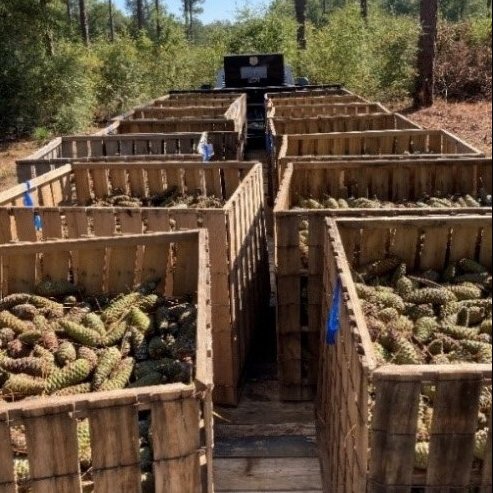Collected Pine Cones Help Restore a Forest on Savannah River Site
U.S. Forest Service employees recently held their annual longleaf pine cone collection event on Savannah River Site (SRS), gathering approximately 700 bushels of pine cones.
The cones will be sent to a facility where the seeds are extracted and planted, and will eventually grow into longleaf pine seedlings at a nursery. Those seedlings will then be used on SRS and by partnering agencies to help restore lands once dominated by longleaf pine forests.
“Collecting cones from known longleaf pine trees that are phenotypically superior ensures great genetic stock. When we replant, we want to know the seedlings will grow well in this area,” Silviculture Forester Jennie Haskell said. “We have had tremendous success planting quality seedlings from locally collected cones as opposed to reforesting with seedlings collected from other zones.”
A silviculture forester manages programs to control the establishment, growth, quality, and health of forests. They analyze forests to maximize timber production and minimize negative impacts on the land, water, and wildlife.
Restoring the longleaf pine community is an important objective for the U.S. Forest Service across the SRS and the southeast region of the U.S. This process takes many years. Reforesting with longleaf pine seedlings is just one step. Prescribed fire, chemical treatments, and harvesting to remove undesirable vegetation and reduce competition are also important in the process.
The longleaf pine community, when maintained with prescribed fire, is one of the most biologically diverse ecosystems in North America. The biodiversity is evident in the abundant understory and groundcover that is important to many wildlife species, including wild turkey, white tail deer, fox, squirrels, many reptiles, numerous songbirds, and native butterflies and other pollinator species.
“Forest management is a long-term ongoing process. We provide sustainable forest products, bioenergy, and economic stability to our local communities. It all starts with collecting the hundreds of seeds contained in each individual pine cone,” Forest Planner David Malone said.

